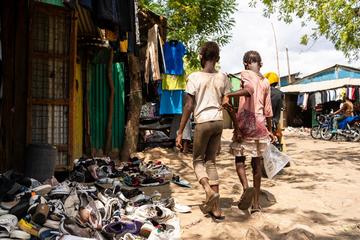
Credit: Raphael Bradenbrink 2022
The global humanitarian system is facing significant challenges. At a time when need has increased, funding has been slashed. In 2025 the United States, historically the world’s largest humanitarian donor, scaled back contributions that accounted for 43% of government funded humanitarian funding. Against this backdrop, disruptions to aid in the form of cuts and delays are inevitable.
New research from DPhil student in Migration Studies at the School of Anthropology and Museum Ethnography Vittorio Bruni and Prof. Olivier Sterck from Oxford and Antwerp Univeristy explores the impact of aid cuts and delays on recipients, and local markets.
Over the course of a year, researchers followed 622 refugee households in Kenya’s Kakuma refugee camp, home to nearly 300,000 refugees and among the largest and longest standing settlements globally. Researchers interviewed participants monthly for one year to track how their socio-economic conditions evolved with the timing and amount of aid received. In addition, they collected price data on goods sold locally and conducted interviews with refugees, shopkeepers and humanitarian workers. The researchers then used this dataset to examine the impacts of cuts and delays in aid across two papers published in SSRN, one focused on aid cuts, another on delays.
Key findings from the research include:
- The impacts of aid cuts were immediate and severe. Hunger increased with the daily caloric intake per person falling by 145 kcal, and households not only ate less, but shifted to less diverse diets.
- The informal credit system, whereby shopkeepers regularly provide food on credit to refugees, collapsed when aid was cut. As the value of future aid transfers fell shopkeepers reassessed repayment risks and, in many cases, refused to extend further credit.
- Food prices fell following the aid cut. As refugees’ purchasing power dropped the demand for food declined and so did local prices, helping cushion some of the negative effects of the aid cut.
- Delays in aid delivery exacerbate hunger and harm wellbeing. During the study period both cash transfers and in-kind food distributions were frequently delayed. For in-kind delays caloric intake drops sharply, up to 15%, alongside reductions in meal frequency, dietary diversity and food security. Many refugees try to cope with delays by going into debt, but food bought on credit is 17% more expensive. Refugees aliso report lower happiness and poorer sleep when aid is delayed.
A summary of the research and its policy implications is available in an article on development economics platform VoxDev.
Read the research in full:
Sterck, Olivier and Bruni, Vittorio, The Welfare and General-Equilibrium Impacts of Aid Cuts (May 27, 2025)
Bruni, Vittorio and Sterck, Olivier, The Welfare and Market of Effects of Delays in Humanitarian Assistance (March 24, 2025)